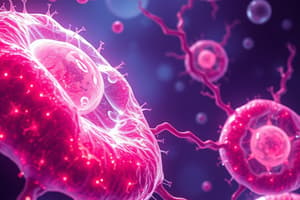Podcast
Questions and Answers
What is the primary process by which stem cells become specialized cells with specific functions?
What is the primary process by which stem cells become specialized cells with specific functions?
Cell differentiation
What is the difference between lineage commitment and terminal differentiation?
What is the difference between lineage commitment and terminal differentiation?
Lineage commitment is when stem cells commit to a specific cell lineage but remain undifferentiated, whereas terminal differentiation is when stem cells fully differentiate into a specific cell type.
What is the role of signaling pathways in cell differentiation?
What is the role of signaling pathways in cell differentiation?
Signaling pathways induce differentiation by transmitting external signals, such as growth factors and hormones, to stem cells.
What is the function of transcription factors in cell differentiation?
What is the function of transcription factors in cell differentiation?
What is the role of epigenetic modifications in cell differentiation?
What is the role of epigenetic modifications in cell differentiation?
What is the first stage of cell differentiation?
What is the first stage of cell differentiation?
What is the role of positive feedback loops in regulating cell differentiation?
What is the role of positive feedback loops in regulating cell differentiation?
What is the role of cell-cell interactions in regulating cell differentiation?
What is the role of cell-cell interactions in regulating cell differentiation?
What is the final stage of cell differentiation?
What is the final stage of cell differentiation?
What is the role of negative feedback loops in regulating cell differentiation?
What is the role of negative feedback loops in regulating cell differentiation?
Flashcards are hidden until you start studying
Study Notes
Stem Cell Differentiation
Definition
- The process by which stem cells become specialized cells with specific functions
- Involves a series of complex molecular and cellular events that lead to the expression of specific genes and proteins
Types of Differentiation
- Lineage commitment: Stem cells commit to a specific cell lineage, but remain undifferentiated
- Terminal differentiation: Stem cells fully differentiate into a specific cell type
Mechanisms of Differentiation
- Signaling pathways: External signals, such as growth factors and hormones, induce differentiation
- Transcriptional regulation: Specific transcription factors and genes are activated or repressed to control differentiation
- Epigenetic modifications: Changes in DNA methylation and histone modification influence gene expression
Key Players in Differentiation
- Transcription factors: Proteins that bind to specific DNA sequences to regulate gene expression
- Examples: Oct4, Sox2, and Nanog in embryonic stem cells
- Signaling molecules: Proteins that transmit differentiation signals
- Examples: BMP, Wnt, and Notch signaling pathways
Stages of Differentiation
- Determination: Stem cells become committed to a specific lineage
- Specification: Stem cells acquire specific characteristics of a cell type
- Morphogenesis: Differentiated cells organize into tissues and organs
- Maturation: Differentiated cells acquire final form and function
Regulation of Differentiation
- Positive feedback loops: Self-reinforcing signals promote differentiation
- Negative feedback loops: Inhibitory signals prevent excessive differentiation
- Cell-cell interactions: Interactions with neighboring cells influence differentiation
Stem Cell Differentiation
Definition
- Stem cells become specialized cells with specific functions through a complex process involving molecular and cellular events
- This process leads to the expression of specific genes and proteins
Types of Differentiation
- Lineage commitment: Stem cells commit to a specific cell lineage but remain undifferentiated
- Terminal differentiation: Stem cells fully differentiate into a specific cell type
Mechanisms of Differentiation
- Signaling pathways: External signals such as growth factors and hormones induce differentiation
- Transcriptional regulation: Specific transcription factors and genes are activated or repressed to control differentiation
- Epigenetic modifications: Changes in DNA methylation and histone modification influence gene expression
Transcription Factors
- Proteins that bind to specific DNA sequences to regulate gene expression
- Examples: Oct4, Sox2, and Nanog in embryonic stem cells
Signaling Molecules
- Proteins that transmit differentiation signals
- Examples: BMP, Wnt, and Notch signaling pathways
Stages of Differentiation
Determination
- Stem cells become committed to a specific lineage
Specification
- Stem cells acquire specific characteristics of a cell type
Morphogenesis
- Differentiated cells organize into tissues and organs
Maturation
- Differentiated cells acquire final form and function
Regulation of Differentiation
- Positive feedback loops: Self-reinforcing signals promote differentiation
- Negative feedback loops: Inhibitory signals prevent excessive differentiation
- Cell-cell interactions: Interactions with neighboring cells influence differentiation
Studying That Suits You
Use AI to generate personalized quizzes and flashcards to suit your learning preferences.




